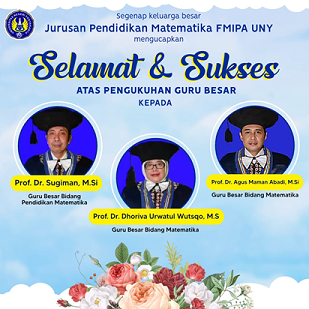You are here
Inauguration of Professor of Three Lecturers of Mathematics Education Department FMIPA UNY
Primary tabs

Yogyakarta State University (UNY) inaugurated 13 professors from six faculties on Saturday, June 19, 2021. Among the 13 professors, three of them are lecturers of the Mathematics Education Department. The three lecturers are Prof. Dr. Agus Maman Abadi, M.si, Professor of Mathematics, and Prof. Dr. Sugiman, M.Si. Professor of Mathematics Education and Prof. Dr. Dhoriva Urwatul Wutsqo, M.S Professor of Mathematics.
The inauguration ceremony of Professors this time was carried out offline (outside the network) limited and online (in the network / online) and broadcast live through the UNY OFFICIAL YouTube channel. The limited offline event held at the UNY auditorium still applies very strict health protocols.
The inaugural event was opened and closed by the Rector of UNY, Prof. Dr. Sumaryanto, M. Kes. Before a short scientific oration by each inaugurated Professor, a procession of reading the Decree of the Minister of Education and Culture related to the granting of the Professor Position was carried out.
Furthermore, each Professor was given approximately 10 minutes to deliver an oration. Next, followed by the core event, namely the Inauguration of Professors. This event was marked by draping Tamir to all Professors who were being inaugurated by the Rector of Yogyakarta State University.
In his short scientific oration, Prof. Dr. Agus Maman Abadi, M.Si. presented the material entitled “The Role of Fuzzy Systems in the Development of Science and Technology”.
“Soft computing is a computational method that utilizes tolerance for imprecision and uncertainty to achieve tractability, robustness, and low solution costs,” he explained.
He explained the main components of soft computing are fuzzy logic, neurocomputing, and probabilistic reasoning. Fuzzy logic deals with imprecision and approximate reasoning. “Unlike computational intelligence which is based on soft computing, Artificial Intelligence (AI) is based on hard computing, both of which play a very important role in the era of the Industrial Revolution 4.0. In its development, fuzzy systems have been widely used in various fields, including control systems, for image, audio, and signal processing, for operations research management, for diagnosis, planning, prediction, natural language processing, intelligent robots, and software,” he explained.
Meanwhile, Prof. Dr. Sugiman, M.Si. delivered an article entitled “Model Bridge as a Trigger for Student Mathematization Process”.
According to Sugiman, mathematics is an object of thought while students are dealing with real objects. When learning mathematics students need to transfer from what they see, observe, and experience to what they think.
The distance between the characteristics of the two (real objects and objects of thought) causes learning mathematics to be full of challenges. This shifting process requires a bridge in the form of a model that makes it easier for students to learn math.
“By passing through a bridge in the form of a model, the mathematization process will be smoother in grading and will shorten the leap of cognitive change in students. The leap of cognition that is too wide can cause the failure of the mathematization process. Intuitively, by using sense, students can build their models provided that the mathematical situation given has the potential to inspire the emergence of ideas in model making,” she said.
Prof. Dr. Dhoriva Urwatul Wutsqo, M.S. in her short scientific oration took the title “Application of Neural Network for Time Series Classification and Forecasting”.
Prof. Wutsqa, DU stated that Neural network (NN) is interesting for researchers in various fields for different reasons. In electrical engineering, neural networks are widely applied in signal processing and control theory.
“In the computer field, neural networks have the potential to be implemented on hardware efficiently and by neural network applications for robots. Computer scientists find that neural networks have very potential to solve problems in artificial intelligence and pattern recognition. For mathematicians and statisticians, neural networks are a powerful tool for modeling problems where the explicit form of the relationship between variables is not known with certainty,” he continued.
Based on the results of training on samples, NNs can infer unknown parts of the population. This principle is by forecasting, which is forecasting future conditions from past conditions (samples). Therefore, NN can be applied for forecasting,” he said.
With the inauguration of the three lecturers as professors, the Department of Mathematics Education is expected to advance the department in the fields of education, research, and community service. This condition is expected to improve the quality of the academic atmosphere which has implications for the quality of learning and the quality of graduates of the Mathematics Education Department, especially in the future.
Lembaga
Copyright © 2026,







